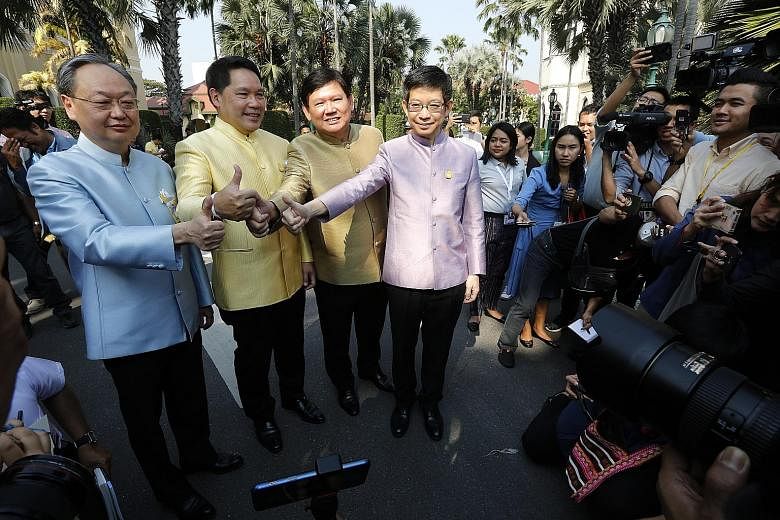Four key ministers contesting Thailand's March 24 election resigned yesterday as political parties began showcasing their candidates and campaign platforms in earnest.
The quartet - Industry Minister Uttama Savanayana, Science and Technology Minister Suvit Maesincee, Commerce Minister Sontirat Sontijirawong and Minister in the Prime Minister's Office Kobsak Pootrakool - tendered their resignation after months of criticism that they were using their positions to favour their Palang Pracharath Party, a newly formed party in which they hold key leadership positions.
The Palang Pracharath Party is widely expected to push for Prime Minister Prayut Chan-o-cha to keep his job after the election.
"Now we are ready - not ready for ourselves but for the country," Mr Sontirat, the party's secretary-general, told reporters yesterday.
The ministers' resignations will take effect today.
The upcoming election will end the military rule that has been in place since 2014, when then army chief Prayut led a coup that toppled the Pheu Thai Party-led government.
A new Constitution enacted in 2017 will make it very difficult for Pheu Thai to win with a sweeping majority like it did during the last election in 2011.
Thailand's future prime minister also need not contest in the general election. Under transitional rules, once a person has been nominated by a political party, he can be made premier if he wins the majority vote in the combined Upper and Lower Houses.
Most of the appointed senators, who are now being selected, will be picked in some form by the ruling junta.
In an interview with The Straits Times last month, Dr Uttama, leader of the Palang Pracharath Party, had said: "Thailand needs a strong and capable leader... during this period of reform and transformation of Thailand. And I think Prime Minister Prayut is suitable for that."
The current military government has heavily promoted a next-generation industrial and investment hub dubbed the Eastern Economic Corridor by the Gulf of Thailand.
Critics charge that it has not done enough to lift rural incomes in a sustainable fashion.
According to the latest World Bank report this month, strengthening private consumption and private investment helped push Thailand's economic growth up to an estimated 4.1 per cent last year, despite trade tensions between China and the United States dimming the global outlook.
Growth is expected to slow down slightly to 3.8 per cent this year under external pressure, said the World Bank.
Over 100 political parties have registered with the Election Commission so far. Those wanting to sign up candidates for the coming election as well as nominate people for premiership have to do so from next Monday to Feb 8. Enthusiastic voters on Monday flooded a website to register for advance voting, causing it to crash briefly.
Meanwhile, key politicians have hit the streets.
Former prime minister and Democrat Party leader Abhisit Vejjajiva has been wading through city markets, handing out leaflets to diners tucking into their chicken rice.
Pheu Thai's chief of strategy and de facto leader Sudarat Keyuraphan is making the rounds alongside party stalwart Chadchart Sittipunt, a popular former transport minister-turned-businessman.

